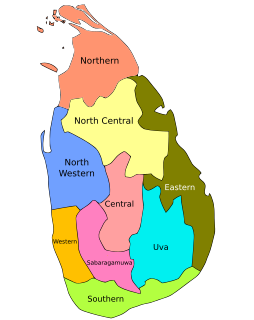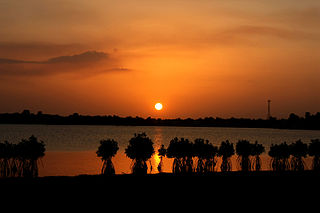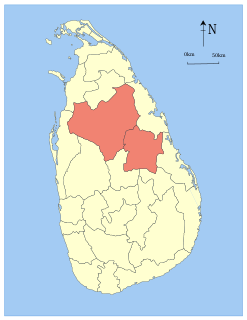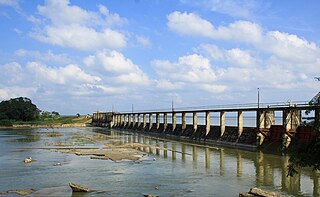Thottakadu, Sri Lanka | |
|---|---|
| Country | |
| Province | Northern Province |
| Time zone | UTC+5:30 (Sri Lanka Standard Time) |
Thottakadu, Sri Lanka is a small town in Sri Lanka. It is located within Northern Province.
Thottakadu, Sri Lanka | |
|---|---|
| Country | |
| Province | Northern Province |
| Time zone | UTC+5:30 (Sri Lanka Standard Time) |
Thottakadu, Sri Lanka is a small town in Sri Lanka. It is located within Northern Province.

In Sri Lanka, provinces are the first level administrative division. They were first established by the British rulers of Ceylon in 1833. Over the next century most of the administrative functions were transferred to the districts, the second level administrative division. By the middle of the 20th century the provinces had become merely ceremonial. This changed in 1987 when, following several decades of increasing demand for a decentralization, the 13th Amendment to the 1978 Constitution of Sri Lanka established provincial councils. Currently there are nine provinces.

The Eastern Province is one of the nine provinces of Sri Lanka, the first level administrative division of the country. The provinces have existed since the 19th century but did not have any legal status until 1987 when the 13th Amendment to the Constitution of Sri Lanka established provincial councils. Between 1988 and 2006 the province was temporarily merged with the Northern Province to form the North Eastern Province. The capital of the province is Trincomalee.

North Central Province is one of the nine provinces of Sri Lanka, the first level administrative division of the country. The provinces have existed since the 19th century but did not have any legal status until 1987 when the 13th Amendment to the Constitution of Sri Lanka established provincial councils. The province is the largest by size, and second least populated in the country. The province consists of the districts of Anuradhapura and Polonnaruwa, both of which were important ancient Sri Lankan kingdoms. The climate is semi-arid, and the forests are dry evergreen forests.

The North Eastern Province was one of the provinces of Sri Lanka. The province was created in September 1988 by merging the Northern and Eastern provinces. This merger was declared illegal by the Supreme Court of Sri Lanka in 2006. The province was formally demerged into the Northern and Eastern provinces on 1 January 2007. The capital of the province was Trincomalee.

UTC+05:30 is an identifier for a time offset from UTC of +05:30. This time is used in India and Sri Lanka, and was formerly used in Nepal. It is five and a half hours ahead of Coordinated Universal Time. Around 1.4 billion people live inside this time zone, making it the second most populous after UTC+08:00.

The following is a list of schools in Sri Lanka.

Jaffna District is one of the 25 districts of Sri Lanka, the second level administrative division of the country. The district is administered by a District Secretariat headed by a District Secretary appointed by the central government of Sri Lanka. The capital of the district is the city of Jaffna.

Kilinochchi District is one of the 25 districts of Sri Lanka, the second level administrative division of the country. The district is administered by a District Secretariat headed by a District Secretary appointed by the central government of Sri Lanka. The capital of the district is the town of Kilinochchi.

Mullaitivu District is one of the 25 districts of Sri Lanka, the second level administrative division of the country. The district is administered by a District Secretariat headed by a District Secretary appointed by the central government of Sri Lanka. The capital of the district is the town of Mullaitivu.

Polgahawela is a town located in north western Sri Lanka. It is most notable for being a major railway junction.
Medawachchiya is a town in the Anuradhapura District, North Central Province of Sri Lanka. Situated 27 km from Anuradhapura, on the A9 Jaffna - Kandy main road, it is 229 km from Colombo. Medawachchiya is also the point from which the A14 main road to Mannar and Talaimannar starts. Medawachchiya is a significant railway junction on Sri Lanka Railways' northern network. Medawachchiya is the junction between the Northern Line and the Mannar Line.
The 1978 Constitution of Sri Lanka provides for the election of members of Parliament from 22 multi-member electoral districts through the proportional representation electoral system.

Mannar is the main town of Mannar District, Northern Province, Sri Lanka. It is governed by an Urban Council. The town is located on Mannar Island overlooking the Gulf of Mannar and is home to the historic Ketheeswaram temple.

The Central Province is one of the nine provinces of Sri Lanka, the first level administrative division of the country. The Central Province is primarily in the central mountainous terrain of Sri Lanka. It is the 6th largest province by area and is home to 2.5 million people. It is bordered by North Central Province to the north, Uva Province to the east, North Western Province to the west and Sabaragamuwa Province to the south and west. The province's capital is Kandy.

The Northern Province is one of the nine provinces of Sri Lanka, the first level administrative division of the country. The provinces have existed since the 19th century but did not have any legal status until 1987 when the 13th Amendment to the Constitution of Sri Lanka established provincial councils. Between 1988 and 2006 the province was temporarily merged with the Eastern Province to form the North Eastern Province. The capital of the province is Jaffna. The majority of the Sri Lankan Civil War was played out in this province.

Chavakachcheri is a large town in the Jaffna peninsula of Jaffna District, Northern Province, Sri Lanka. It may have Javanese origins, as the name "Chaavaka+cheari" literally means Javanese settlement. The town may date back to the Southeast Asian occupation of Yalpanam, where certain settlements and forts were established by Chandrabhanu to maintain hegemony over the overseas colony. The town is governed by an Urban Council. Chavakachcheri has been badly devastated in the Sri Lankan Civil War. Today, the government and the people of Chavakachcheri have rebuilt the town, but the population remains drastically lower than the pre-war years.

Pallai, also spelt Palai, is a small town in the Kilinochchi District, Northern Province, Sri Lanka.

Northern Provincial Council is the provincial council for the Northern Province in Sri Lanka. In accordance with the Sri Lankan constitution, NPC has legislative power over a variety of matters including agriculture, education, health, housing, local government, planning, road transport and social services. The constitution also gives it powers over police and land but successive central governments have refused to devolve these powers to the provinces. NPC has 38 members elected using the open list proportional representation system.
Reginald Cooray is a Sri Lankan teacher and politician. He is a former provincial chief minister and a former government minister. He is the 5th Governor of the Northern Province, and was briefly the Governor of the Central Province in April 2018, his tenure lasting for less than 24 hours, making it the shortest of any Governorship in Sri Lankan history.
The Government of the Northern Province refers to the provincial government of the Northern Province of Sri Lanka. Under the Sri Lankan constitution the nine provincial governments of the country have power over a variety of matters including agriculture, education, health, housing, local government, planning, road transport and social services. The constitution also gives them powers over police and land but successive central governments have refused to devolve these powers to the provinces. Legislative power rests with the Northern Provincial Council whilst executive power rests with the Governor and Board of Ministers.